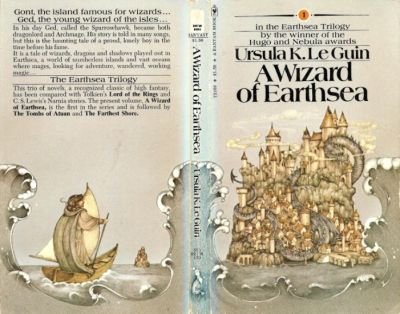The Boy Who Lived
A Wizard of Earthsea (Earthsea, volume 1)
By Ursula K. Le Guin

7 Aug, 2016
Because My Tears Are Delicious To You
0 comments
Tell me if you’ve heard this before: a young man with a talent for magic leaves his home village (where he was always something of a misfit) to attend a school for wizards, where he finds himself confronting a disembodied evil. Anyone? Anyone?
This is, of course, Ursula K. Le Guin’s 1968 award-winning classic A Wizard of Earthsea, first volume in the Earthsea Cycle.
Sparrowhawk knows just enough magic to save his village from Kargish invaders. He knows so little that his ignorance has nearly killed him. He is saved by Ogion the Silent, who then takes him as an apprentice. Ogion tries to teach him patience, humility, and mystical Balance; spells will come later.
That’s not enough for the ambitious young magician.
Ged accepts an invitation to study magic with the other student wizards on the island of Roke. There he learns many useful things — but not humility or self-control. Drawn into a rivalry with fellow student Jasper, headstrong Ged tries magic far beyond his student skills.
Ged survives, at the cost of Archmage Nemmerle’s life, but a great and nameless evil is released on the world.Ged completes his education within Roke’s magical protections, safe from the shadow he freed. Once adult, there is nothing for it but to venture out into the wider world, despite the certainty that his creation is still active, still eager to take Ged’s body for its own.
If the shadow gets the chance. The island-sprinkled world of Earthsea is old and filled with hazards (some known, some long-forgotten). Ged may not live long enough to confront his nemesis.
~oOo~
I’ve used the cover of the edition I own. Other covers are arguably even more iconic but that’s the one I have.
I didn’t spot the parallels to the Harry Potter books until recently. Did Earthsea influence Rowling? Or is it, as seems more likely, is this just another case of two authors independently arriving at similar narrative starting points? (Development and conclusions? Not so similar.)
The setting is an archipelago, not the usual continent divided into quarreling kingdoms. I was rather hoping for a thrilling exploration of the implications of island biogeography as laid out in the 1967 classic The Theory of Island Biogeography. I was disappointed. At least there’s nothing in the book that directly contradicts current biogeographic models.
American fantasy is generally whiter than a convention filled with Elric cosplayers and this was even truer back in 1968 (when fantasy was a smaller genre than it is now). Earthsea is an exception to this rule: most people are dark. Pale skinned people are rare and their main role in this book is to provide a young Sparrowhawk with a menace to overcome.
Given Le Guin’s well-known feminism, I was surprised on this rereading, to see that the novel takes a dim view of women. In the world of Earthsea, there is a saying “As weak as women’s magic,” which is followed by “Wicked as women’s magic.” It could be that the misogyny reflects, not the author’s viewpoint, but the beliefs of Earthsea culture. But … the few female characters in the novel do not do much to contradict the misogyny. One is a scheming, evil sorceress; another is a simple, ignorant hedgewitch; still another is a teenage flirt who tempts Ged into foolish action. The only good woman with any significant role is a friend’s sister. A kind, sensible woman of great competence, but not a magician.
[Editor’s note: No wonder, then, that Le Guin tried to right the balance with the later books in the series. IMHO, WoE was one of her earlier books, when she was still struggling to escape genre conventions.]
Le Guin could easily have written a straightforward tale of good versus evil. Some of Ged’s early efforts involve uncomplicated struggles: he rids an island of an infestation of dragons; he outwits a power-hungry woman. In the end, those are merely distractions to the larger struggle. The shadow he raised cannot be defeated or truly vanquished by force or cunning tricks. It can only be dismissed if Ged embraces the lessons that Ogion had tried to teach him.
Earthsea was never a best-seller, but it has been a steady seller. As far as I know, it has been in print ever since it was first published half a century ago. It was adapted as a BBC radio play (one I have not heard), a Sci Fi television miniseries that was an abomination, and a Studio Ghibli animated movie that meant well.
A Wizard of Earthsea can be purchased here.
